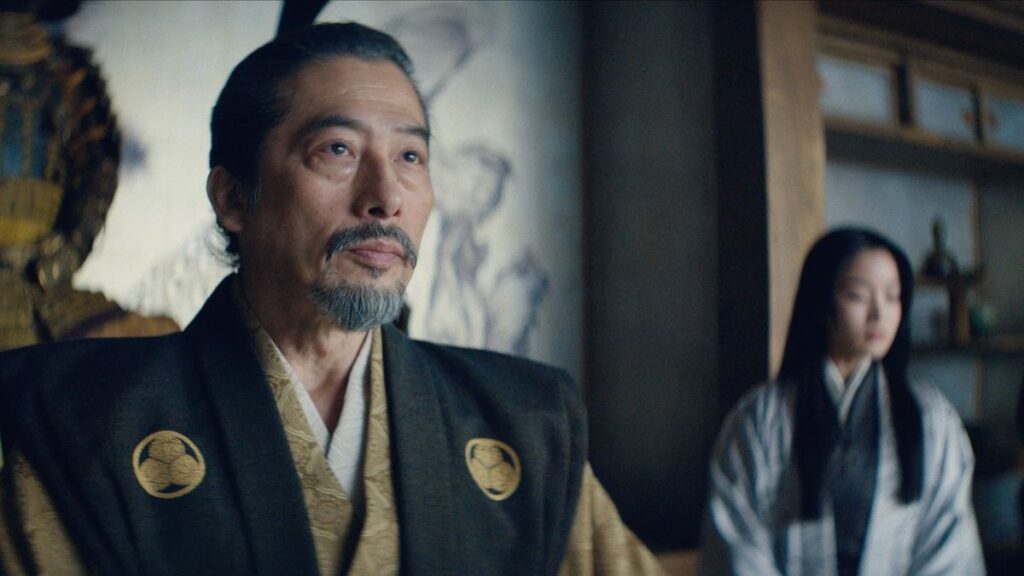“Shogun,” a show about a guy who is so bad at boating that he crashes in Japan, is the best thing on TV right now. Lauded with glowing reviews and hotly debated about water heaters around the world, this show joins the pantheon of shows that my most annoying friend (me) always asks, “Have you gotten around to watching it yet?” It seems like it will be. it's not. I still have to go to Succession, The Sopranos, The Wire, and Better Call Saul.
But Today's Shogun is not the only adaptation of the 1975 original novel. Back in the '80s, the world was obsessed with Shogun mania. There was a nine-hour miniseries (starring Toshiro Mifune!) and a Broadway musical of his that audiences reportedly found mystical. And here's where it's relevant to you. Me – Two video game adaptations.
The problem is: Shogun is a vast and politically ambitious novel that tells a story of family intrigue, warlords, and the clash and mixing of cultures. Video games in the 80's were mostly about little yellow heads eating ghosts. Getting the message across to the media was a challenge, but the developers still tried. Twice. 1986 and 1989. I respect their ambition, but now that I've played in both, I'll never forgive them. This is the report to the emperor.
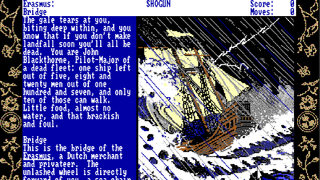
We start with the later games. Because it makes sense. And I'm still in a mental recovery phase from his 1986 game experience. It's a text adventure, a book you can talk to. and came out of Infocom towards the end of the decade.
Imagine my excitement. I love a good text adventure. All of my youth was spent wandering through the Ascii Halls of Achaia, Dreams of the Divine Lands, fully text-based multi-user dungeons (MUDs) that have somehow survived to this day . Text Adventures understood that everyone on Earth longs to interact with their environment through a set of esoteric tools such as going north, grabbing keys, etc.
What Infocom's Shogun understood even better was what fans were doing. Really Desire is to live the events in the book literally and be punished with instant death if it deviates even slightly from Clavel's text. The game actually takes place in a number of scenes that are barely connected. You begin as the main character Blackthorn, a general who is having a very bad day on board a ship. His crew almost died and his ship was lost in a stormy sea. The only reason the rest of his men do not revolt is because they are all suffering from scurvy, exposure, and poverty.
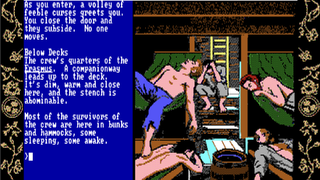
“It's like James Clavell's great novel The General! Explore its world and characters, make interesting decisions and make enlightening discoveries about the world that I loved on its pages. It's a great opportunity.”
No, you idiot, you idiot. Why did I start thinking like that? Your role in Infocom's game is to become a general speedrunner of sorts. Hone yourself into the perfect tool, whose sole purpose is to navigate the book's plot in the most efficient way possible. Being bored is death. Want to chat with the crew? Death. Want to read your diary? death. Would you like to take another look at the room you're in? That's fine. No, I'm just kidding. It's death.
Want to chat with the crew? Death. Want to read your diary? death. Would you like to take another look at the room you're in? That's fine. No, I'm just kidding. It's death.
It's purely trial and error. Your only real objective is to find the exact sequence of inputs until you crash on the coast of Japan. If you deviate from the optimal course, a hidden timer will move inexorably towards your doom.what should A fun opportunity to explore the world of a novel from a new perspective becomes a grueling experiment in video game Taylorism. Focus on the grindstone of finding the most efficient route through this scene in the book. Or die. Death is also an option.
At least, this was my experience for the few hours or so I spent with this game. To be honest, I was hard-headed. For most of the game, I was determined to chart an honest path, no matter what the game wanted from me. Straighten the ship's course, rattle the rudder, force a near-death crew member to do their job, and inexplicably come into conflict. apples etc. The only time I raised my hand and used the game's hint system was when I died for the 17th time or so (which I'm encouraged to avoid). At that point, they laughed at me for asking the question. was listed About my pet rat in the hint menu.
So I gave up on that and relied on online walkthroughs. thank godBecause there's no way I'll ever come across the correct set of inputs myself. We're talking about a “rotate once to port, wait three times, then rotate four times to starboard” level of convolution.
Anyway, we were told exactly what to do and things went well until we finally crashed on the coast of Japan. According to the walkthrough, my final task was to ask Vink to help me pilot the ship. But Vink is gone. he is absent He is missing and on the run. Is he maybe dead? Perhaps Vink also accidentally spent too much time staring at his desk. Whatever the reason, the man was not on deck despite my clear orders to be there early.
So I still crashed, just ran into something wrong. Died.
James Clavell's Shogun (Mastertronic, 1986)
I remember my time at this game the same way I think most people remember Woodstock. It is simply a collection of images and sensory input and can never be ordered.it is strangeI can't help but think so, and that's why I have much more attachment to it than the text adventure successors.
That doesn't mean I like it. I'm not sure I can like something that I can't quite understand after spending an hour or more with it, but I can't help but be pleasantly fascinated by something that puzzles me to some extent.
Anyway, here's what the game is about. Except no. Because I don't even really know what the goal is here. Full disclosure: I played an emulated version of this game without the manual, and it felt pretty much like trying to land an airliner using the Force.
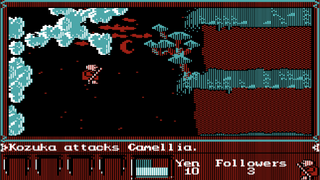
Here's a quick explanation of what I did experienced: First, Mastertronic's James Clavell's General asks you to choose a character from a gallery of lords and samurai. Having not read the book, I had no idea who they were, nor did I understand what their titles (character classes?) meant. I decided on a samurai because I thought they were cool and I thought the mechanics of hitting people with a sword would be easier to understand than when a feudal lord did it. I've seen orchids, and their lives are more complicated than average, like fratricide.
Anyway, I'm clearly an idiot because playing as a samurai wasn't any more obvious than playing someone else. 1986's Shogun is not a text adventure. You are thrown into some kind of small open world and can wander the earth. All the while, a kind of news ticker appeared at the bottom of the screen: “Camellia escapes!” The moment I pressed the play button, “News from the General” appeared. [sic] Palace'', then “Hachiman attacks Kozuka'', then “Toranaga becomes friends with Peregrine''.
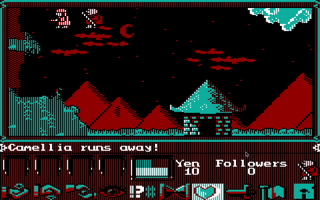
It felt like I was participating in a heated discussion in a language I didn't fully understand. Something important is clearly happening, and you probably should know what it is, but you just don't have the tools you need to figure it out. So you just nod and hope for the best. “Muraji becomes friends with Brad” Huh? Well, great stuff. Hmm, good luck.
Even ignoring the ever-changing ticker with mysterious events, I was at a loss. A quick look at his YouTube comments on Mastertronic's old gameplay videos of his Shogun gave us a few hints. My goal apparently is to gather followers (probably 30), which I'll manage to win. Well, okay. I approached the countless NPCs wandering around the game and started befriending them.
It felt like I was participating in a heated discussion in a language I didn't fully understand
There are lines of commands along the bottom of the screen, and as you scroll between them, a soothing sliding scale of notes plays. I approached a man and tried to take advantage of him.
A quick side note: The maps in Mastertronic's Shogun are all laid out like side-scrolling levels, but you can move around the map as if you were controlling things from a bird's-eye view. Imagine Mario 1-1. But you can go north and it looks like you're walking into the sky.
So, yes, I decided to approach a man who is a little over the moon and push him to follower number one. He selected an icon that suggested an exchange of funds, and as the amount he selected 10 yen, which was all the money he had. I wasn't sure if he was giving this person 10 yen or asking for it, but I was happy when he responded with a big smile and said, “Thank you!” It suggests that I literally gave all my money to this vagrant moonman.
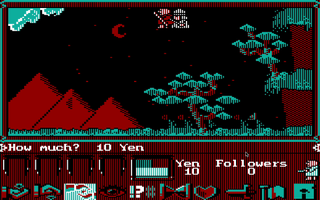
Anyway, it didn't seem like it could accomplish anything more than making the person's day better, so I tried something else. I selected the speech bubble, scrolled through the list of available commands, and settled on “Protect.” It seemed like a great option! I order him to protect me, which is basically like having a follower.
One problem, though, was that I didn't remember who I was, and apparently I could order this guy to protect literally anyone in Japan. I almost immediately abandoned this plan and decided to ask this nameless comrade and general heir to my lifetime fortune, someone named “Mrs. Mariko,” to protect me. Perhaps that will do the trick.
He agreed. This was amazing and I decided to try something different. Could it be that “Guard” protects me by default? It didn't. It meant “Please protect this area.” My soldier friend, having no doubts about the conflicting orders to protect both Lady Mariko and the moon, readily agrees and quickly exits the level with Doomguy-like speed.
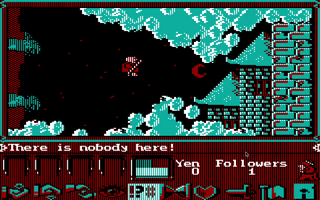
I wandered around a bit, more messages scrolling along the bottom of the screen, “Blood attacks Gekko! Gekko runs away!” and I felt a sense of resistance and helplessness. At one point, I noticed that my follower count had increased to 2 and felt oddly proud, even though I had no idea how it happened, until I finally saw a message on my screen that said, “News.'' I lost someone while it was displayed. west palace. ” Perhaps it was the news that I really was a poor daimyo.
I want it to end with a climax. I once encountered a rogue samurai cutting me to shreds in the Hokkaido snow, but to be honest, I just wandered around for a long time. Perhaps that's the message of A Winter's Tale: The Lion for 80's gamers growing up. Maybe I just didn't understand my role in the game. It's hard to say.
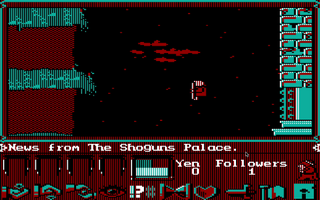
All I can say is, if you want to imagine Mastertronic's 1986 Shogun game, imagine a deranged old man wandering the sky forever. I don't think it's all bad. Even worse happens at sea.


